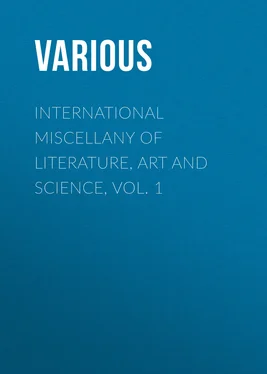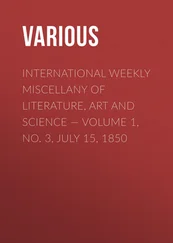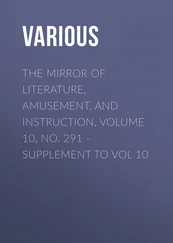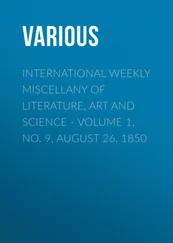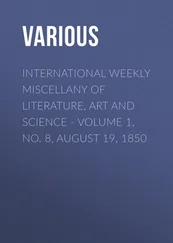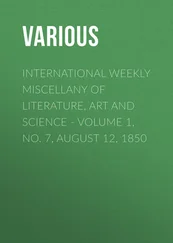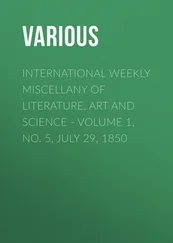Various - International Miscellany of Literature, Art and Science, Vol. 1
Здесь есть возможность читать онлайн «Various - International Miscellany of Literature, Art and Science, Vol. 1» — ознакомительный отрывок электронной книги совершенно бесплатно, а после прочтения отрывка купить полную версию. В некоторых случаях можно слушать аудио, скачать через торрент в формате fb2 и присутствует краткое содержание. Жанр: foreign_antique, periodic, foreign_edu, на английском языке. Описание произведения, (предисловие) а так же отзывы посетителей доступны на портале библиотеки ЛибКат.
- Название:International Miscellany of Literature, Art and Science, Vol. 1
- Автор:
- Жанр:
- Год:неизвестен
- ISBN:нет данных
- Рейтинг книги:3 / 5. Голосов: 1
-
Избранное:Добавить в избранное
- Отзывы:
-
Ваша оценка:
- 60
- 1
- 2
- 3
- 4
- 5
International Miscellany of Literature, Art and Science, Vol. 1: краткое содержание, описание и аннотация
Предлагаем к чтению аннотацию, описание, краткое содержание или предисловие (зависит от того, что написал сам автор книги «International Miscellany of Literature, Art and Science, Vol. 1»). Если вы не нашли необходимую информацию о книге — напишите в комментариях, мы постараемся отыскать её.
International Miscellany of Literature, Art and Science, Vol. 1 — читать онлайн ознакомительный отрывок
Ниже представлен текст книги, разбитый по страницам. Система сохранения места последней прочитанной страницы, позволяет с удобством читать онлайн бесплатно книгу «International Miscellany of Literature, Art and Science, Vol. 1», без необходимости каждый раз заново искать на чём Вы остановились. Поставьте закладку, и сможете в любой момент перейти на страницу, на которой закончили чтение.
Интервал:
Закладка:
M. JULES LECHEVALIER, known in this country chiefly as one of the foreign Correspondents of The Tribune , but in Europe as an able writer on the Social Sciences, has recently delivered in Paris and Berlin, and in London, (where he is residing as a political exile,) a series of lectures, which will soon be given to the world in a volume, upon the subject of his favorite studies. M. Lechevalier's system, which he denominates "New Political Economy," is based upon the principle of association, in opposition to that of competition and laissez-faire , which constitute the groundwork of the school of the present political economists. In the course of his series he pointed out the gradual tendency of the competitive principle to produce extremes of riches and poverty, and ultimately revolutions, and maintained, that by the adoption of the associative principle alone, society can be preserved from confusion and destruction. He contends that the new political economy, or Socialism , is essentially Conservative, while the present system of unlimited competition, or buying cheap and selling dear, is destructive, M. Lechevalier pretends to base his system on the moral principles of Christ, and maintains that Christianity cannot be practically carried out in any other way. His lectures abound in examples of the working of the two opposing systems.
The Doctrinal Tract and Book Society, Boston, are going forward in the work of re-publishing the old standard works of the New-England theology. They have issued a fine edition of Bellamy and have procured an edition of Edwards the younger. They are now about commencing the stereotyping of Catlin's Compendium, and the whole works of Dr. Hopkins. We wish they would go back a century further, and give us the best works of Mather and his contemporaries.
There is a political novel by OTTO MULLER, of Manheim, announced, under the title Georg Volker: ein Vreiheits Roman , which is said to give a faithful picture of the Baden revolution, and to open with the rise of the peasantry in the Ottenwald .
THE DUC DE LA ROUCHEFOUCAULD's celebrated "Moral Reflections, Sentences, and Maxims," have just appeared in a new and very much improved translation, and with notes, pointing out similarities of sentiments in ancient and modern authors, and sometimes proving that Rochefoucauld's good things have been made use of without sufficient acknowledgment, by moderns. There is also an introduction, which dissertates well on the purpose and quality of the reflections. Such books were once very popular; but in this country they have not been much read. We have indeed had numerous editions of "Lacon," and Dr. Bettner's "Acton" has found a thousand purchasers; but the Rev. Dr. Hooker's "Maxims," which, in our opinion, are as good as anything of their kind in the English language, we believe have not attracted attention, and Mr. Simms's "Egeria" has been printed only in the columns of a newspaper.
A new theory has just been propounded at Paris in a book called "Armanase," (a Sanscrit word, meaning the "Reign of Capacity"). The author asserts the present forms of administrative government are injurious instead of useful to society, and ought to be replaced by institutions of a new and different order. His principle is, that the sovereignty of the individual ought to be instituted for that of governments, and that great associations of mutual assurance may be advantageously substituted for the existing system of management by office-holders. The author shows also that the progress of the natural and mechanical sciences will deliver man from the pressure of the more painful sorts of labor; and that wealth, freed from the barriers which now hinder its circulation, would be distributed freely throughout society. Intellectual property would be seriously guaranteed, and would enrich the men of genius, whose inventions and discoveries are now profitable, not to the authors, but to the capitalists who take advantage of them. By this means an important element of revolutions will be removed. The author proposes, that in order to prevent all suffering, a civil list shall be set apart for the people, who will be the king. This civil list is to be composed of a tax of one per cent., levied on all who have property in favor of those who have nothing. But, says he, let no one imagine that all would be dissolution and ruin in this system, without law or government. Crimes and offenses will be tried by juries, that is to say, by a living code. Property will no longer be seizable for debt, and the courts will become useless. Everybody shall have the absolute right to buy land by paying its possessor ten per cent, on its value: this is to give a chance for carrying on all sorts of grand public enterprises without trouble from the proprietors of little pieces of land. It may perhaps be doubted, whether the "Reign of Capacity" has exhibited any astonishing endowments in that respect.
THACKERAY, in Pendennis , has given offense, it appears, to some of the gensd'armes of the Press, by his satirical sketches of the literary profession. Those whose withers are unwrung will admit the truth of many pages and laugh at the caricature in the rest. In the last number of the North British Review is a clever article upon the subject, written with good temper and good sense. Hitherto publishers have been ridiculed and declaimed against as "tyrants" and "tradesmen,"—made to bear the onus of "poetical" improvidence, and to sustain the weight of a crime which no author can pardon—the rejection of manuscripts. The authors have painted the portraits of publishers; but an ancient fable suggests that if the lion had painted a certain picture, it would not have been a lion we should see biting the dust.
M. DE LUYNES is now engaged at Paris in publishing a work on the antiquities of Cyprus. He has discovered a number of inscriptions in ancient Cyprian writing, and is having them engraved on copper. The writing is that which preceded the introduction of the Phoenician character upon the island, and seems to have no affinity either with that or with the Assyrian, which is discovered to have been once used there. The work of M. de Luynes will open a new problem for the philologists. It will be difficult to decipher the inscriptions and language, unless there can be found somewhere an ancient Cyprian inscription, with a translation in some known tongue; but in a time which has read the riddles of the pyramids, nothing of this sort is to be despaired of. M. de Luynes is the last of the great French nobles who makes a worthy use of his riches.
SIR ROBERT PEEL left full and specific directions in his will for the early publication of his political memoirs; and ordered that the profits arising from the publication shall be given to some public institution for the education of the working-classes. He believed his manuscripts and correspondence to be of great value, as showing the characters of the great men of his age; and directed that his correspondence with the Queen and Prince Albert shall not be published during their lives without their express consent. He confided the task of preparing these memoirs to Lord Mahon and Mr. Cardwell. Their duty will, however, be comparatively light, though delicate, from the admirable and orderly state in which he left his papers.
MR. JOHN P. BROWN, author of "The Turkish Nights Entertainments," recently published by Putnam, is now on a visit to this country as the Secretary of the Commissioner of the Sublime Porte, Captain Ammin Bey.
Читать дальшеИнтервал:
Закладка:
Похожие книги на «International Miscellany of Literature, Art and Science, Vol. 1»
Представляем Вашему вниманию похожие книги на «International Miscellany of Literature, Art and Science, Vol. 1» списком для выбора. Мы отобрали схожую по названию и смыслу литературу в надежде предоставить читателям больше вариантов отыскать новые, интересные, ещё непрочитанные произведения.
Обсуждение, отзывы о книге «International Miscellany of Literature, Art and Science, Vol. 1» и просто собственные мнения читателей. Оставьте ваши комментарии, напишите, что Вы думаете о произведении, его смысле или главных героях. Укажите что конкретно понравилось, а что нет, и почему Вы так считаете.
